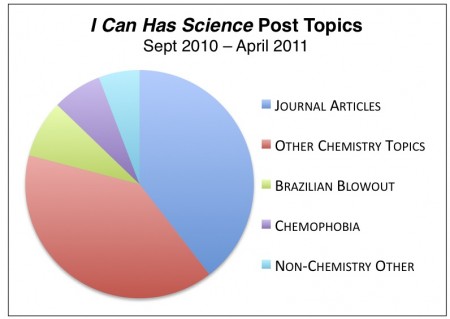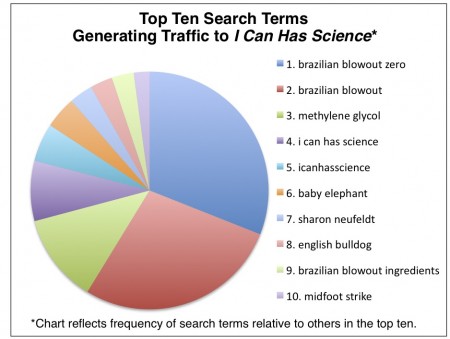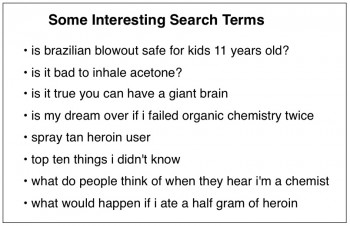I began this blog last September as an experiment. Like any good experiment, this particular one was designed to answer a question. Over the past few weeks, I’ve been mulling over the “data” I’ve acquired through this experiment, and realized I have sufficient data to draw a conclusion. Since this blog is about science (and because I’m kind of a nerd), it seems appropriate to share my results in the format of a scientific paper. What follows comes complete with an abstract, so feel free to just read that or skip to the conclusions (like one normally does with scientific papers) if you just want to get the gist of it. There’s also supporting information at the end, with gratuitous pie charts. Here goes:
Abstract
My experience so far with this blog has revealed that I like writing, not for the sake of writing, but because I like trying to explain concepts and relate chemistry to real life. My efforts to write about other people’s research has led me to conclude that I want to be in a career that allows me to stay involved with research. Thus, I’ve determined that I want to pursue a career in academics. With this goal in mind, I really need to focus as I enter the final 1.5 years of grad school, so blog postings will be considerably less frequent.
Introduction
When I applied for graduate school, I had a vague notion that I’d go into academics after I finished. But for the most part, I wasn’t pursuing a PhD because of career aspirations. I simply wanted to study chemistry because I liked it. Really, really liked it. And I’ve been incredibly fortunate to have an advisor who shares surpasses that enthusiasm.
Near the middle of my 3rd year in the PhD program (early 2010), it began to sink in that I was going to graduate someday (i.e., in about 2.5 years) and I needed to figure out what I wanted to do with the rest of my life. The standard career options for a PhD chemist are industry or academics, but there are also the “non-traditional” careers: science policy, patent law, science writing, etc.
There are aspects about each of these careers that I might enjoy. I like teaching. I like thinking about chemistry and coming up with ideas. I like labwork when stuff is working. I like writing. I like mentoring. Sometimes I like debating. But I didn’t feel completely certain about any of the career options. And since choosing your career track is kind of a big deal, it seemed that I needed to start collecting data to figure out what career I could fit into best. After all, I am a scientist, right? This decision should be made scientifically.
I was attracted to the idea of a science communication field. So I decided to start this blog to (a) try my hand at writing about science and (b) to simultaneously answer the following grammatically awkward question:
What is it about science that I most like doing?
Experimental
(Pardon the passive voice in this section, it just feels natural for an experimental.)
 I Can Has Science was started in September 2010, with the initial goal of writing about current scientific research in a manner understandable by non-scientists. This goal was chosen for two reasons: (1) If I wanted to consider science writing as a career, I’d better figure out how to write about science for a general audience, and (2) By restricting my use of jargon, I would force myself to really look at science more fundamentally, rather than getting lost in details.
I Can Has Science was started in September 2010, with the initial goal of writing about current scientific research in a manner understandable by non-scientists. This goal was chosen for two reasons: (1) If I wanted to consider science writing as a career, I’d better figure out how to write about science for a general audience, and (2) By restricting my use of jargon, I would force myself to really look at science more fundamentally, rather than getting lost in details.
Posts were written an average of 2.53 times per week for a total of (thus far) 34 weeks, typically between the hours of 9 pm and midnight (± 2 h). An effort was made to write frequently about journal articles (usually non-chemistry), but random chemistry topics were written about just as frequently.
Results
While I enjoyed writing about other people’s research, I’ve found that I prefer writing about other random chemistry topics. I like trying to figure out how chemistry relates to real life, and how best to explain ideas. For example, this was probably my favorite post to write.
Furthermore, when I did write about somebody else’s research, I found myself getting distracted from “translating” what they did into non-jargony text. Instead, I wished I could sit down with the authors and ask “Oh did you try this experiment?” or “What do you think would happen if you did this instead of this?” or “Did you run this control?”. I really wanted to get my hands dirty and get involved with the research, not just write about it.
The following observations were made (by me. this passive voice thing is getting out of control):
• I like chemistry better than science-in-general
• I like writing, not for writing’s sake, but for the challenge of explaining concepts and relating chemistry to real life
• I would be discontent with a career that doesn’t allow me to be involved with research
Conclusions
Explaining concepts sounds like teaching. And research sounds like research. When you combine teaching with research… well, that’s called being a professor. Thus I have come full circle and deduced that I want to be a professor when I grow up. The jury is out on whether or not I will ever get there, but I think I have to try.
With this goal now in mind, I really need to focus on doing what I need to do be on the right track. I have a backlog of ideas for blog posts, so I will try to get to them as I have time. But I will be posting less frequently, as it’s more important right now for me to spend my 9 pm – midnight hours doing other things. So, I am not dead. I am just not posting very often : )
Acknowledgments
Chemjobber, Matt, Leigh, Adam, C&EN folks, and others have been super welcoming and supportive as I’ve tried to wedge my way into the blogging community.
My advisor, who has never told me not to do this blog thing. (And is great for many other reasons.)
My technologically savvy mom (site administrator. Also great for many other reasons).
Supporting Information
Here are some pie charts and stuff!





I’ve enjoyed reading your blog, and this post is a good one! I do think your conclusions are a bit premature, however, and may be driven somewhat by what you expected to find. In particular, I believe the conclusion “when you combine teaching with research…that’s called being a professor” could use some deeper analysis.
There are two parts to research, and almost everybody gets hung up on the first part. Discovering new things about the universe is only half the job – the other half is teaching them to somebody else, so the discovery becomes useful. In any research organization, even big pharma, you only get paid for research that you can teach. Doctors will not prescribe drugs if they don’t know what they do, why they work, and what the consequences might be. Venture capitalists will not invest in commercializing a patent if they don’t understand the significance of the invention. Government agencies will not fund a project if they don’t understand the scientific rationale behind it. Newspaper reporters cannot report a discovery with any context if you can’t explain the science behind it on their level and on the level of their readership. You can’t lead or even collaborate on a research project if you can’t teach what you study.
I have a masters degree in chemical education and I did teach chemistry formally – and I found it incredibly difficult and unrewarding. So little classroom time actually involved teaching, so much was spent parenting, babying, cajoling, defending, judging, and moderating. I have been in research outside of academia for over twenty years now, and I have spent that entire time truly teaching, and finding it much more rewarding. When you discover something, you are the one person in the world who knows it. Until you teach somebody else, that is completely useless.
Excellent post- and a fitting way to refocus into your renewed passion for academics. Soul searching’s hard. When I interview folks I ask a lot of the kinds of questions you mention, but there’s no amount of money you could pay me to get back into the lab to do the experiments myself. You’d make a fantastic science writer, but organic chemistry needs great communicators like you! Best of luck (and see you Friday)…
Always happy to support another blogger/grad student/chemist! 🙂
Glad to hear that you’ve found your calling and are focusing in on it. It’s a long and often difficult road, but I’m sure you’ll do great!
I loved reading this post, Sharon. While I agree with Mike that there are many ways to get “what” is is that you want, I think that it is smart to proceed as though you are moving toward a professorship. All the things that get you a TT job will make your resume look good for the other kinds of jobs as well. And, if I can presume, you seem the type of person who is going to be actively engaged in building your “non-standard” techniques.
I wish you all the best and look forward to reading about things on this site!
Thanks all : ) I’ll just have to see what happens, but I agree with your way of putting it Matt – proceed as though I’m moving toward a professorship. Can’t hurt, right?
Mike, I totally agree with you that there is more to research than just research. I actually have several semesters of experience lecturing in front of a class, so I feel fairly confident about my level of “like” for the traditional sort of teaching. As far as the type of teaching you’re talking about – explaining one’s own research – that’s pretty exciting to me, but something I need to improve on for sure.
(Carmen, see you Friday : )
I really really like reading your blog. In fact your posts are so chemically so absorbing and intoxicating that I’ve become addicted to them (i know it kinda sounds cheesy :P). Well, its sad that the posts will be less frequent, but I hope that after you done the PhD, they’ll be more frequent.
I especially like those posts in which you explain chemical application that are around us, like the recent post on sour patch kids. And also those in which you explain an academic concept with a twist like the aminals and animals metathesis post etc. So may I suggest a topic which you may be interested in writing (I’m too lazy and preoccupied to look on it myself :P). What do you think about the ? I mean how are memories stored and recalled in the brain chemically? May be its a very broad question, but if you write something on it, I bet it will be worth reading.
All the best with your research
*what do you think about the chemical nature of memories?
Thanks! I feel like I read a paper kinda recently about the chemical nature of memories… something about phosphorylations maybe (?) I would have to look into it. Good suggestion!! And thanks for your feedback, makes me want to write some more. Soon. : )
To my logical cognition you already ARE grown up and I like what you already … be (poetic licensure with that “be”).
To the emotional accompaniment to that logic, you will never be grown up because I will always think of/cherish you as my “little girl.”
Some people are decidedly, to the point of being considered “unbalanced,” more affected and influenced by emotions than reason and others are… vice versa. And some people seem to swing back and forth depending on subject, circumstances and sleepiness. Chemistry there, do you suppose?
And that brings another thought to mind, like the “which came first, chicken or egg” question: Could chemistry in the brain be a cause … or is it within the realm of possibility to consider that it could be the effect … of the mysterious but active and “live” origin of an individual’s thoughts?
Enough sleepy thoughts. Off to dreamland now.
I like to write just to get things off my mind.
Career in academics? We have plenty of them. Don’t get brain washed. I got my Masters. I know after getting my BSEE I went out into the real world. I found people without degrees that could design circles around me. Yeah, I had the theory. but no one showed my how to put it to practical use.
When I came back for my Masters, I remember I was having trouble with a concept so I held my hand up and asked “I’m willing to put as much time as needed to master this concept if you can answer one question for me…Where will I use this in the real world?” His answer, “yours is not to reason why, yours is to do and die”. So much for academics.
I love this blog! Worth my time reading. 😉
Now that you are getting closer to your goal, I think your mind is pretty much made up. Especially when I see that your last post was a full year ago. So either you have already become an absent minded professor or you do not get much time to write. Anyway best of luck to you.
The latter is correct. Whether I become an absent minded professor is yet to be determined… thanks so much though!